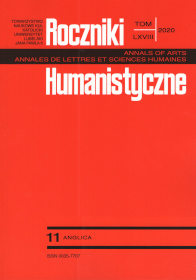Liminal Spaces in The Ancrene Wisse
Abstract
The historical approach to the situation of female recluses who lived in small communities in the High Middle Ages has fostered the interest in the literature of formation produced at the time for such groups. While referring to the female need to remain in seclusion, one of these pieces, the early 13th-century Ancrene Wisse, also shows a profound concern over those servants who, following their ladies into their religious retirement, still belonged to the world and served as a link with the outer sphere. This work will analyze how Ancrene Wisse, while still dictating and enacting the discourse of enclosure for religious women, also permits a more lenient treatment on the issue of the presence of servants, a duality that renders the piece as a peculiar dialogic one.
References
Aelred of Rievaulx. Aelredi Rievallensis. Opera omnia I: Opera Ascetica, edited by Anselm Hoste and C. H. Talbot, Brepols, 1971.
Bloch, Howard. Medieval Misogyny and the Invention of Romantic Love. U of Chicago P, 1991.
Bond, James. “English medieval nunneries: Buildings, precincts, and estates.” Women and Religion in Medieval England, edited by Diana Wood, Oxbow Books, 2003, pp. 46–90.
Brown, Peter. The Body and Society. Men, Women, and Sexual Renunciation in Early Christianity. Columbia UP, 1988.
Bynum, Caroline Walker. Holy Feast and Holy Fast: The Religious Significance of Food to Medieval Women. U of California P, 1987.
Cannon, Christopher. “Enclosure.” The Cambridge Companion to Medieval Women’s Writing, edited by Carolyn and David Wallace, 2003, pp. 109–23.
Dinshaw, Carolyn, and David Wallace, editors. The Cambridge Companion to Medieval Women’s Writing. Cambridge UP, 2003.
Dobson, E. J. The Origins of Ancrene Wisse. EETS, 1976.
Farina, Lara. “Women and Reading.” The History of British Women’s Wtiting, 700–1500, edited by Liz Herbert McAvoy and Diane Watt, Palgrave, 2003, pp. 142–50.
Georgianna, Lynda. The Solitary Self. Individuality in the Ancrene Wisse. Harvard UP, 1981.
Gilchrist, Roberta. Gender and Material Culture: The Archaeology of Religious Women. Routledge, 1994.
Grayson, Janet. Structure and Imagery in Ancrene Wisse. U of New Hampshire, 1974.
Green, D. H. Women Readers in the Middle Ages. Cambridge UP, 2007.
Hanawalt, Barbara, and M. Kobialka, editors. Medieval Practices of Space. U of Minnesota P, 2000.
Herbert McAvoy, Liz, and Marc Hughes-Edwards, editors. Anchorites, Wombs and Tombs. Intersections of Gender and Enclosure in the Middle Ages. U of Wales P, 2005.
Herbert McAvoy, Liz, and Diane Watt, editors. The History of British Women’s Writing, 700–1500. Palgrave, 2003.
Horner, Shari. The Discourse of Enclosure. State U of New York P, 2001.
Jäggi, Carola, and Uwe Lobbedey. “Church and Cloister: The Architecture of Female Monasticism in the Middle Ages.” Crown & Veil: Female Monasticism from the Fifth to the Fifteenth Centuries, edited by Jeffrey F. Hamburger and Susan Marti, Columbia UP, 2008, 109–31.
Lees, Clare A., and Gillian R. Overing. Double Agents: Women and Clerical Culture in Anglo-Saxon England. U of Pennsylvania P, 2001.
Lefebvre, Henri. The Production of Space. Translated by Donald Nicholson-Smith, Blackwell, 1991.
Licence, Tom. Hermits and Recluses in English Society. 950–1200. Oxford UP, 2011.
Lochrie, Karma. Covert Operations. The Medieval Uses of Secrecy. U of Pennsylvania P, 1999.
Lochrie, Karma. “Between women.” The Cambridge Companion to Medieval Women’s Writing, edited by Carolyn Dinshaw and David Wallace, Cambridge UP, 2003, pp. 70–90.
McNamara, Jo Ann. A New Song: Celibate Women in the First Three Christian Centuries. Harrington Park Press, 1983.
Lochrie, Karma. Sisters in Arms. Catholic Nuns through Two Millennia. Harvard UP, 1996.
Millett, Bella. Ancrene Wisse. Guide for Anchoresses: A Translation. U of Exeter P, 2009.
Newman, Barbara. From Virile Woman to Woman Christ: Studies in Medieval Religion and Literature. U of Pennsylvania P, 1995.
Power, Eileen. Medieval English Nunneries. Cambridge UP, 1922.
Robertson, Elizabeth. Early English Devotional Prose and the Female Audience. The U of Tennessee P, 1990.
Salisbury, Joyce. Church Fathers, Independent Virgins. Verso, 1991.
Schulenburg, Jane Tibbetts. Forgetful of Their Sex: Female Sanctity and Society, ca. 500–1100. The U of Chicago P, 1998.
Smith, Julie Ann. Ordering Women’s Lives: Penitentials and Nunnery Rules in the Early Medieval West. Ashgate, 2001.
Spacks, Patricia Meyer. Gossip. U of Chicago P, 1985.
Tally, Robert T. Spatiality. Routledge, 2013.
Tolkien, J. R. R. The English Text of the Ancrene Riwle: Ancrene Wisse: Edited from MS Corpus Christi College Cambridge 402. EETS, Oxford UP, 1962.
Venarde, Bruce L. Women’s Monasticism and Medieval Society. Nunneries in France and England, 890–1215. Cornell UP, 1997.
Wada, Yoko. A Companion to the Ancrene Wisse. D. S. Brewer, 2003.
Webb, Diana. Privacy and Solitude in the Middle Ages. Humbledon Continuum, 2007.
Wogan-Browne, Jocelyn. Saints’s Lives & Women’s Literary Culture. Virginity and Its Authorizations. Oxford UP, 2001.
Wood, Diana. Women and Religion in Medieval England. Oxbow Books, 2003.
Copyright (c) 2020 Roczniki Humanistyczne

This work is licensed under a Creative Commons Attribution-NonCommercial-NoDerivatives 4.0 International License.





